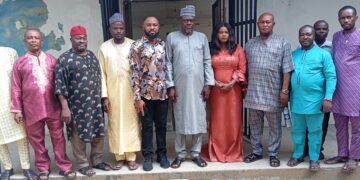In a move emblematic of his commitment to fostering unity and inclusivity, the Chairman of Akamkpa Local Government Council, Hon. (Ophot) Felix Akposi KSJI, held a groundbreaking interface with the leadership of non-indigenes residing in the area. The meeting, held at the council headquarters, was attended by leaders of major ethnic communities, including Dr. Sam Umoh of the Akwa Ibom community, Chief Emmanuel Ezeobi Emmanson of the Igbo community, and Alhaji Ahmed Igboke representing the Hausa/Fulani group, among others.
Addressing the gathering, Hon. Akposi expressed gratitude to God for the opportunity to convene as a family, emphasising the significance of mutual respect and coexistence. “We are all brothers, and it is our duty to be our brother’s keeper,” he remarked. He noted that the prolonged residency of some non-indigenes, spanning over three decades, affirms Akamkpa as their second home—a testament to the area’s welcoming nature and cultural harmony.
Hon. Akposi further reiterated his administration’s resolve to ensure that non-indigenes feel an integral part of the community. “This is a new administration and a new Akamkpa where everyone matters. Your contribution to the socio-economic fabric of this local government cannot be overlooked,” he stated. He commended the entrepreneurial strides of non-indigenes, who manage some of the largest business ventures in the area, while also calling for concerted efforts to address issues of crime and social vices.
Referencing a survey indicating a dual narrative of economic vibrancy and rising crime rates among some non-indigene communities, the Chairman urged community leaders to champion the cause of peace and lawfulness. “Let us collectively discourage the culture of violence and embrace progress. Crime does not pay,” he admonished.
In a major policy highlight, Hon. Akposi announced efforts to restore electricity in Akamkpa, revealing discussions with the state Governor, Sen. Prince Bassey Edet Otu, on the subject. He expressed optimism that the ongoing plans would soon yield results, creating a more conducive environment for residents and businesses alike.
The engagement was not limited to deliberations. Hon. Akposi used the occasion to share Christmas cheer with the non-indigene communities, presenting them with over 40 bags of rice, assorted condiments, and cash gifts. He reassured the group that this meeting was only the beginning of continuous engagements aimed at leaving a lasting legacy of unity and development.
Responding to the Chairman’s gesture, the leaders of the various communities lauded his inclusive approach and open-door policy. “This is the first time we are witnessing such a personal engagement with the Chairman of the Council,” they noted. They praised his visionary leadership, describing it as a unifying force for Akamkpa’s diverse population.
In a show of solidarity, the non-indigene leaders announced the formation of a coalition to enhance information sharing and prompt responses to communal issues. “With your open-door policy, accessibility and collaboration will become seamless,” they assured.
The meeting underscored a shared vision of a united and prosperous Akamkpa under Hon. Akposi’s leadership. The symbolic distribution of Christmas gifts served as a beacon of goodwill and mutual respect, fostering a spirit of togetherness during the festive season.
As the curtains fell on the event, the Chairman’s message resonated deeply: Akamkpa is home for all who dwell in it, and its transformation will be achieved through collective effort and unwavering commitment to peace, inclusivity, and progress.
Also in attendance at the meeting were the Vice Chairman, Hon. Emilia Katame, and the Secretary of Council, Mr. Christian Lawrence Attah.














